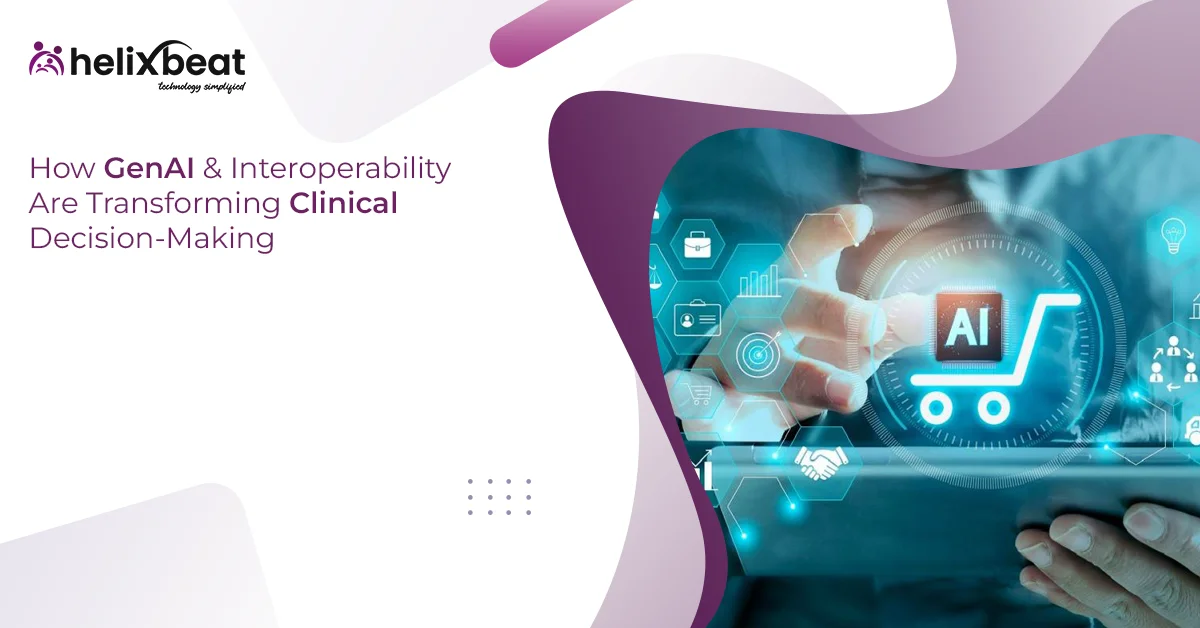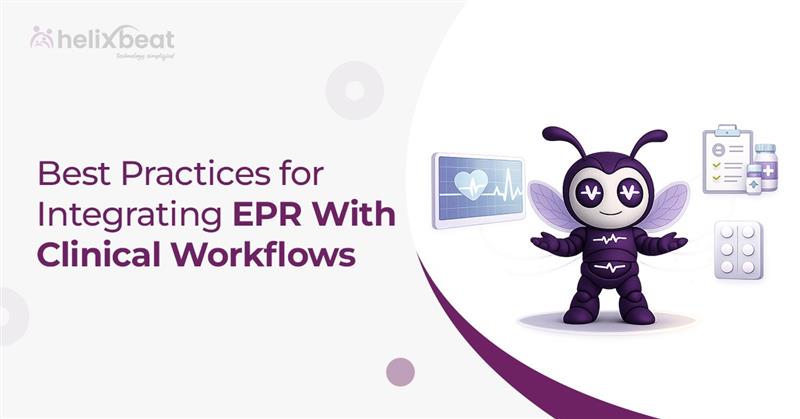In the era of smart technology and data-driven healthcare, the way doctors make clinical decisions is evolving rapidly. Instead of relying on memory or scattered patient files, doctors now have advanced tools at their fingertips, thanks to Generative AI (GenAI) and healthcare interoperability.
Together, these technologies are transforming the way doctors diagnose, treat, and monitor patients. The result? Quicker, more accurate, and more personalized care.
So, how do GenAI and interoperability work together to improve clinical workflows? Let’s dive in and find out.

Table of Contents
The New Challenges in Clinical Decision-Making
Before diving into how GenAI and interoperability are solving problems, it’s important to understand what clinicians face today:
- Data overload: Physicians are faced with thousands of data points per patient, encompassing vital signs, lab results, imaging studies, and EHR notes.
- Fragmented systems: Different hospitals and clinics often utilize disconnected systems, which restrict access to a comprehensive patient history.
- Time pressure: Clinicians have limited time to review all relevant data before making decisions.
- Rapid medical advancements: Staying updated on new treatments, drugs, and protocols is a constant challenge.
These complexities create gaps in judgment, delayed diagnoses, and even preventable errors. This is where GenAI and interoperability step in as allies to modern medicine.
GenAI in Clinical Decision-Making: Beyond Automation
Generative AI is a form of artificial intelligence that can process vast datasets, generate new content (like summaries, insights, or predictions), and provide contextual recommendations.
Here’s how GenAI is enhancing clinical decision-making:
1. Summarizing Complex Patient Histories
Doctors often sift through multiple documents to understand a patient’s condition. GenAI can rapidly summarize structured and unstructured EHR data into concise medical overviews, highlighting relevant diagnoses, medications, allergies, and trends.
For example, before entering a patient room, a physician can receive a one-page GenAI-generated summary that includes:
- Recent lab abnormalities
- Past treatment outcomes
- Drug interactions
- Risk flags based on history
This saves time and facilitates informed care.
2. AI-Powered Diagnostic Assistance
GenAI can analyze patterns in imaging, genomics, and lab tests to suggest possible diagnoses. While not replacing clinicians, it acts as a second set of eyes—helping identify conditions that may not be immediately obvious.
For example, in radiology, AI models can detect lung nodules, fractures, or signs of stroke faster than traditional interpretation. When embedded into clinical workflows, this supports earlier interventions.
3. Personalized Treatment Recommendations
By learning from millions of similar patient cases, GenAI tools can recommend optimal treatment paths tailored to a patient’s age, comorbidities, and genetic makeup.
For example, in oncology, GenAI might analyze molecular test results and propose targeted therapies based on outcomes from similar tumor profiles.
Interoperability: Connecting the Dots in Healthcare
Interoperability in healthcare refers to the ability of different IT systems and software to communicate, exchange, and interpret patient data consistently.
Standards like FHIR (Fast Healthcare Interoperability Resources), HL7, and SMART on FHIR are enabling this seamless flow of information across:
- Hospitals and clinics
- Labs and pharmacies
- Payers and public health agencies
- Wearables and remote devices
Here’s how interoperability plays a critical role in better decision-making:
1. Access to Longitudinal Health Records
When clinicians have a full view of a patient’s medical journey—regardless of where care was received—they can make more accurate decisions.
For example, if a cardiologist in Chicago can access lab data and discharge summaries from a patient’s earlier hospitalization in Houston, they can avoid repeating tests or prescribing conflicting medications.
2. Real-Time Data Integration
Interoperable systems allow real-time syncing of data from remote monitoring devices, such as:
- Glucose monitors
- Heart rate trackers
- Sleep monitors
This continuous stream of data helps doctors make decisions based on current patient status, not just periodic visits.
3. Streamlining Care Coordination
Interoperability helps different care providers—from specialists to primary doctors—stay on the same page. This is especially useful for patients with chronic conditions who require multi-disciplinary care.
A shared care plan supported by interoperable records leads to fewer errors, fewer redundant procedures, and more cohesive treatment.
When GenAI Meets Interoperability
The real transformation happens when GenAI and interoperability work hand in hand.
Unified Data + Intelligent Insights = Smarter Decisions
Interoperability makes the data available.
GenAI makes the data understandable and actionable.
Let’s walk through a scenario.
Dr. Mitchell, a primary care physician in Boston, is seeing a new patient with Type 2 Diabetes, hypertension, and early-stage chronic kidney disease.
Traditionally, Dr. Mitchell would have to:
- Manually track down the patient’s medical history from various providers
- Scroll through multiple scanned PDFs and visit summaries
- Interpret lab results and past prescriptions from disconnected systems
- Double-check for any potential drug interactions on her own
With GenAI + Interoperability, here’s what happens instead:
- The EHR system pulls in data from the patient’s previous care episodes at hospitals in Philadelphia and New York, along with real-time data from their glucose monitoring app via a FHIR-based API.
- GenAI analyzes the entire record and delivers a concise summary—highlighting risk scores, A1C trends, blood pressure patterns, and recent gaps in medication adherence.
- It identifies that the patient’s current ACE inhibitor may be aggravating kidney function and flags this risk.
- The system recommends switching to a safer alternative with dosage guidelines based on outcomes from similar patient cohorts.
Dr. Mitchell reviews the insights, agrees with the recommendation, and sends a prescription directly through the EHR—all in just a few minutes.
This level of care coordination isn’t speculative—it’s already being implemented in advanced health systems across the U.S.
What Happens When AERIS Meets GenAI?
AERIS, the adaptive exchange interoperability software, is built to do more than just connect systems—it unlocks intelligent, real-time data exchange across the healthcare ecosystem. With native FHIR (Fast Healthcare Interoperability Resources) support, AERIS enables seamless integration with Generative AI (GenAI) models.
Here’s what happens when AERIS meets GenAI:
- Instant Summarization: GenAI models trained on clinical data can use FHIR-enabled feeds from AERIS to generate accurate, up-to-date patient summaries for doctors.
- Predictive Insights: With interoperable access to labs, vitals, and medication data, GenAI can suggest risk scores and intervention paths, powered by structured FHIR inputs.
- Faster Deployment: AERIS minimizes integration time by delivering clean, FHIR-ready APIs to plug directly into GenAI platforms, reducing development friction.
Final Thoughts
The combination of GenAI and interoperability is redefining how healthcare decisions are made. No longer confined to isolated data silos or manual reviews, clinical decision-making is becoming faster, smarter, and more personalized.
By connecting data and layering it with intelligence, these technologies allow clinicians to focus on what truly matters—delivering the right care to the right patient at the right time.
Contact us today to witness how you can bring true interoperability with AERIS in your healthcare ecosystem.
FAQs
1. How does interoperability benefit clinical decision-making?
Interoperability allows health systems, devices, and applications to exchange and interpret patient data seamlessly. This gives clinicians access to complete patient histories, real-time vitals, and external medical records, leading to more informed and accurate decisions.
2. Will GenAI replace doctors in clinical decision-making?
No. GenAI is designed to support, not replace, clinicians. It acts as a decision-support tool, offering insights, alerts, and recommendations. The final medical judgment remains in the hands of qualified healthcare professionals.
3. How are GenAI and interoperability connected?
Interoperability brings together data from multiple systems and sources. GenAI builds on that data to generate intelligent insights. When combined, they create a powerful clinical decision support environment that’s both comprehensive and context-aware.
4. What kind of data does AERIS by Helixbeat support?
AERIS is a FHIR-based interoperability solution that supports HL7and FHIR standards. It enables seamless data exchange between EHRs, labs, pharmacies, and third-party health platforms.














